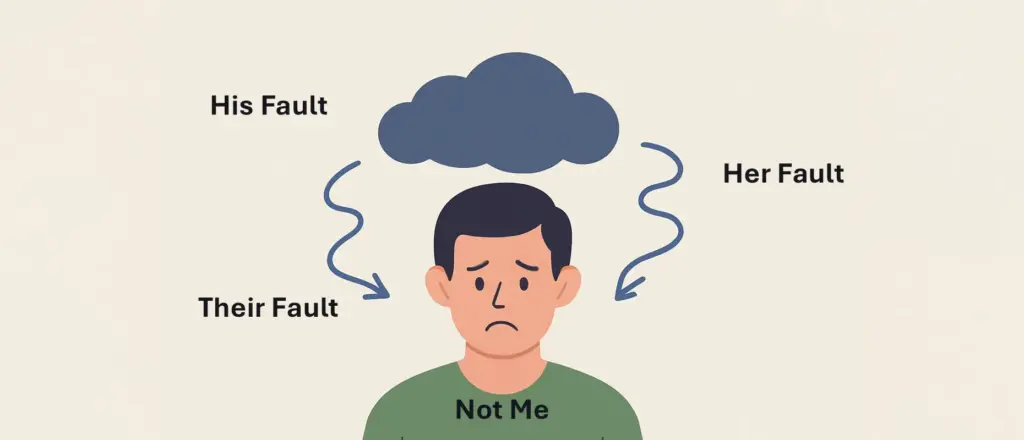The Comfort of Blame
Have you ever noticed someone not performing well in an exam and blaming the teachers for not teaching well, or a player losing a match and claiming it was unfair? Maybe a person arrives late to an event and blames traffic. While these can sometimes be valid reasons, in the same circumstances, others might succeed—scoring well in the exam, giving an outstanding performance, winning the match, or reaching the event on time despite heavy traffic. It’s often easier to blame external factors or forces beyond our control because it reduces our sense of responsibility and protects our self-esteem. Sigmund Freud describes this behaviour as a defence mechanism, a psychological strategy to defend against feelings of guilt or inadequacy.
Even in the corporate industry, a deadline missed is attributed to a peer not being able to provide a prerequisite. A promotion not offered is often considered as office politics. People play victim to avoid being blamed, to seek attention, and sometimes only out of fear. There are some related high-profile corporate incidents, too:
Toyota (2010 accelerator recall) faced with a global recall of around 8 million vehicles due to faulty accelerator pedals from a third party supplier, Toyota attributed the issue to supplier quality failures.
Satyam Computer’s (India) accounting fraud worth over US $1 billion was uncovered, top management initially laid blame on rogue employees, failing software systems, or external consultants—rather than admitting to a deeply ingrained internal culture of misrepresentation.
Volkswagen after being exposed manipulating diesel emissions tests, executives initially pointed to pressure from higher-level leadership or corporate culture rather than acknowledging internal design failures.
In each case, the initial response was to externalize the problem, attributing it to external factors or individuals. However, deeper investigations revealed that the issues were rooted in internal systems, cultures, and practices. Recognizing and addressing these internal factors is crucial for preventing similar issues in the future.
The habit feels protective in the moment—but it costs us in the long run.
The Real Reason We Point Fingers

Blame-shifting often comes from three key sources:
- Ego-protection: Blaming others or circumstances preserves self-esteem from the sting of failure
- Low self-awareness: A lack of insight into one’s own self and responsibilities can result in consistently attributing problems externally
- Learned behaviour: Patterns from past experiences where blame-shifting is normalized can persist into adulthood
This might be helpful in preserving self-esteem in that moment, yet it has major and long-term impacts:
- Avoidance of responsibility: Regularly attributing failure to outside causes can prevent a person from being accountable and, hence hampering personal growth.
- Loss of motivation: Believing outcomes are beyond control diminishes effort and perseverance and depletes motivation and reinforce victim mindset too.
- Stunted self-awareness: If we keep blaming our failures on external factors, we will never introspect and learn from our mistakes.
- Relationship strain: Blaming others consistently will simply create a toxic blame game culture in the workplace.
The alternative? Shifting from blame to ownership.
- Practice self-compassion: Owning mistakes isn’t shameful. Its human!
- Open dialogue on how a setback can be taken up as an opportunity to learn.
- Be open to feedback from others to balance your view.
- Introspect to understand how to contribute more efficiently.
Often, we hear lectures on taking charge of your life. However philosophical it may sound, it turns out to be a strategic approach towards personal growth. Externalizing blame for a situation is not just defensive; it can also be a self-serving bias. Psychology research shows that people with an external locus of control often exhibit a self-serving bias, attributing success internally but failures externally.
Turning “It’s Not My Fault” into “Here’s What I Can Do”
We’ve seen time and again that real change—whether in a person, a team, or an entire company—starts with one thing: ownership.
In our leadership programs, coaching, and culture-building work, we help people shift from pointing fingers to raising their hands. Not to take the blame, but to take charge.
When you own both the wins and the mistakes, something powerful happens—you learn faster, you adapt better, and you build trust with the people around you. Teams work with more openness, leaders inspire more confidence, and organizations move forward with purpose.
In today’s fast-paced world, blame stalls progress. Ownership clears the path. And it’s on that path where real transformation begins.
